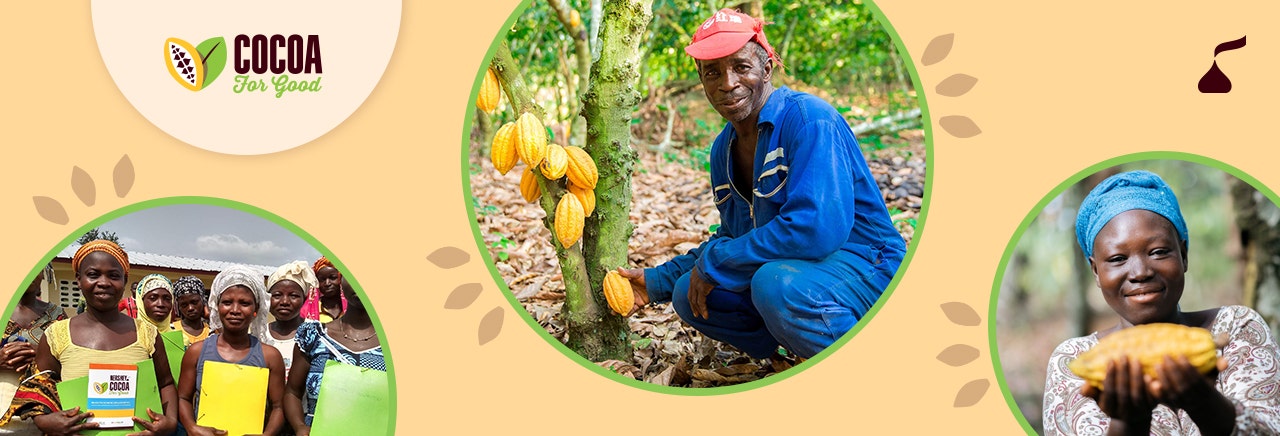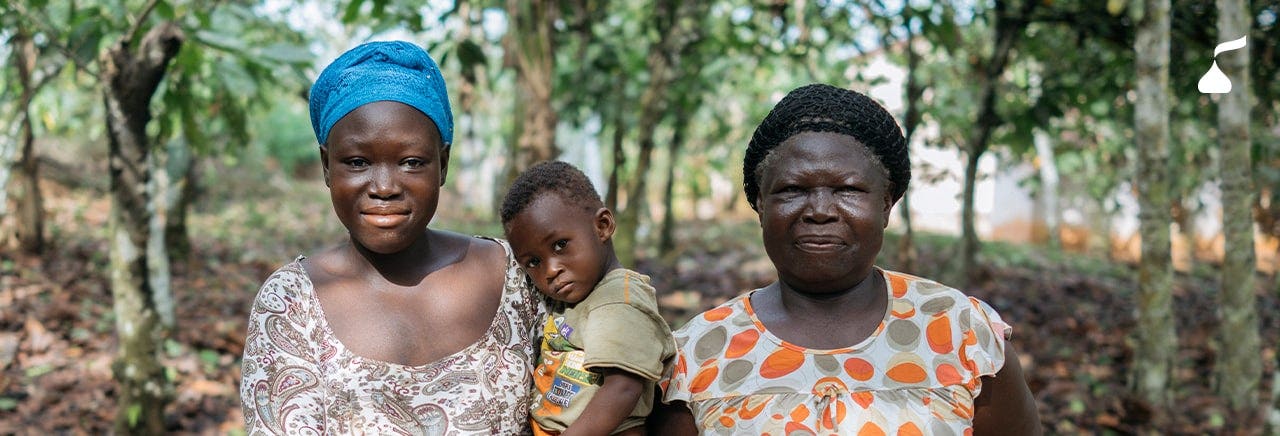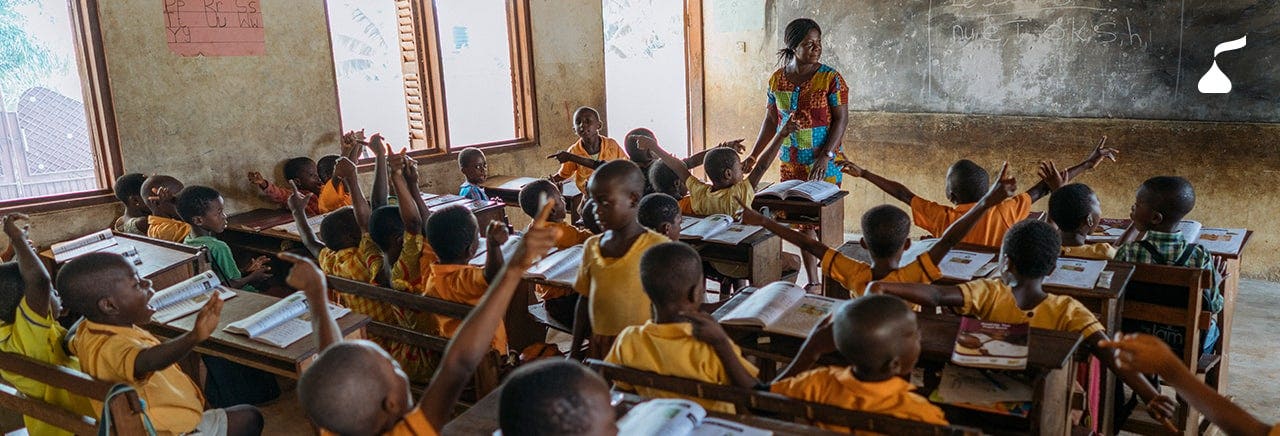Cocoa
At Hershey, we have long believed in doing good. We’re working to make cocoa-growing communities and ecosystems stronger for generations to come.
Cocoa For Good
In 2018, we launched our Cocoa For Good strategy—our approach to creating more goodness inside cocoa communities and helping create a resilient future by tackling systemic social and environmental challenges. We’re investing half a billion dollars by 2030 to improve income resiliency and livelihoods, prioritize children’s well-being, and protect the environment.
Related Articles

Our pledge to invest half a billion dollars in these communities by 2030 is translating to meaningful results on the ground, helping to keep children in school, helping to diversify and increase incomes, giving farmers the support to build thriving businesses and protecting forests.

Through our holistic cocoa sustainability strategy, Cocoa for Good, we're nourishing children, empowering youth, helping communities prosper and preserving ecosystems.

Our Cocoa For Good strategy is at the heart of our sustainable cocoa work. Driving social and economic benefits, with the help of our partners, helps eliminate child labor. Together, we're working to keep children in school and away from dangerous activities.
Related Articles
Independently Verified Cocoa
Hershey has continued to deliver on our commitment of 100 percent independently verified cocoa, which we first achieved in 2020. Hershey sources cocoa through the world's most recognized cocoa certifying organizations: Fair Trade USA and Rainforest Alliance, and other independently verified programs through our suppliers that meet our Cocoa Key Requirements.
While Hershey only sources independently verified cocoa for all brands, we label some of our products as “certified,” including, but not limited to, Brookside products (U.S. and Canada), Hershey Special Dark products (Brazil) and barkTHINS™ products (U.S.).
Cocoa Supply Chain Traceability
Traceability is a vital means to understand how and if supply chains comply with our policies, standards and values. When we know where our beans have come from, we can assess how they have been grown and how the people who grew, harvested and processed them were treated. During the past few years, we have been investing in improving the traceability of our cocoa supply chain and have currently achieved 88 percent sourcing visibility of our cocoa volume originating from Côte d’Ivoire and Ghana and are on track to reaching our 2025 commitment of 100 percent.
Improving income resilience and livelihoods
We believe Cocoa Farmers deserve a decent standard of living and access to those opportunities that will enable that. Cocoa farmers are challenged by limited access to credit, weak negotiation power, over-reliance on cocoa for income, aging plant stock, lack of commercial training and social imbalances. Our aim is to support cocoa farmers’ transition out of poverty. This is the guiding purpose of the Income Accelerator we have launched in Côte d’Ivoire following consultations with the Ivorian government, farmer cooperative groups and other local and international partners.
The Income Accelerator, which expands on programming included in our Cocoa For Good strategy, will support cocoa farmers, their families and cocoa farming communities through a multi-faceted approach focused on providing cash transfers, encouraging sustainable farm management practices, building primary schools in cocoa-growing communities and establishing additional village savings and loan associations (VSLAs).
- Cash transfers (CTs) are a proven poverty reduction strategy that provides cocoa households with an additional source of income. As part of our strategy, CTs will be based on the adoption of sustainable and regenerative farm management practices that increase farm resiliency to unexpected economic and environmental circumstances.
- Village savings and loan associations (VSLAs) are community-based groups that build social cohesion and help increase economic stability. VSLAs provide members with a local structure for increasing savings and accessing loans at low interest rates in farming communities where formal banking or micro-financing services are scarce. The flexible and inclusive financing provided through VSLAs delivers benefits that contribute directly to improved income, enhanced food security, engagement of women in household decision-making, support for greater financial literacy and entrepreneurship.
We’re also continuing to reinforce our existing Cocoa For Good strategies including ongoing engagement with our farmer groups. In 2022, through Cocoa For Good, Hershey expanded its support to 130 farmer groups, reaching more than 105,000 farmers through our suppliers across seven origins – 10% of which were female farmers.
Farmer groups provide a mechanism for farmers to enhance their negotiating power and gain access to valuable agricultural inputs, which increases the potential earnings and economic resilience of cocoa farmers and their families. With our support, farmers groups have been able to get cocoa certification and/or verification in compliance with credible sustainability standards. This has not only helped us reach our goal to source 100 percent independently verified cocoa, but it also ensures that the farmer groups and their farmers are paid a higher premium for their harvests.
- At the group level, the premium is used to invest in shared equipment and capacity building, such as training on climate-smart cocoa techniques and income-diversification opportunities.
- Farmers also receive direct cash payouts from the premium that enables them to reinvest in their farms and their families, including buying food, paying school fees and covering medical expenses.
Read our Living Wage & Income Position Statement to learn more about our commitments to prosperity for cocoa farmers.
Protecting the Environment
Hershey acts to protect forests and help restore forest cover in the cocoa-growing regions in West Africa. Since 2018, Hershey has publicly committed to no new deforestation in our global supply chains. By monitoring forest conditions and changes, promoting affordable land titling and spreading climate-positive farming tools across cocoa-growing regions, we have been able to deliver on this commitment.
As one of the first signatories of the Cocoa & Forests Initiative (CFI) Framework of Action in 2017, we have publicly declared a set of actions related to forest protection and restoration, sustainable production and farmer livelihoods, and community engagement and social inclusion, which we report on an annual basis.
In April 2023, Hershey launched a partnership with the Foundation for the Parks and Reserves of Cote d'Ivoire to support the protection and management of the Mabi-Yaya Nature Reserve. The partnership includes reforestation of nearly 1000 hectares inside the reserve.
Hershey has also committed to end deforestation across its supply chain by 2030 with a company-wide no deforestation policy.
Child Labor Monitoring and Remediation Systems
Hershey does not tolerate child labor within our supply chain, and we are working to prevent and eliminate it within cocoa communities. To find out more about the work we’re doing to support and protect children and families in cocoa-producing countries, please visit our Child Labor Monitoring and Remediation page.
Human Rights Due Diligence in Cocoa
The Hershey Company is committed to protecting and respecting human rights as outlined in our enterprise Human Rights Policy. Our comprehensive approach to human rights due diligence in cocoa builds on our commitments to 100 percent independently verified cocoa, supply chain traceability and mapping, deforestation prevention and the implementation of a Child Labor Monitoring and Remediation System. Key steps in our due diligence process include:
- Country of origin risk assessments: Annual review of origin risks drawing on publicly available information as well as our own sourcing data related to child labor, forced labor, deforestation and income vulnerabilities.
- Supplier sustainability assessments: An annual survey of our direct suppliers’ sustainability and responsible sourcing practices and management systems.
- Manufacturing site risk assessments: Ongoing requirement that all sites that provide cocoa and cocoa products to Hershey are required to have an up-to-date Sedex Self-Assessment Questionnaire and SMETA audit (or equivalent).
- Farm-level risk assessments: Hershey has reached 100 percent independently verified cocoa, which includes on-farm assessments and monitoring against credible standards (i.e., Rainforest Alliance and Fair Trade USA) through independent auditors.
- Child Labor Monitoring and Remediation System (CLMRS): By 2025, Hershey is committed to expanding CLMRS to 100 percent of farmers producing Hershey’s cocoa volume in Côte d’Ivoire and Ghana. CLMRS is the key mechanism used to prevent, monitor and remediate child labor.
- Grievance mechanisms: In 2022, we expanded our efforts by conducting worker surveys, including ELEVATE’s Worker Sentiment Survey and a Ulula/Sedex worker survey, to allow workers to anonymously and confidentially share their perceptions of their working environment to a trusted grievance mechanism. Hershey’s Supplier Code of Conduct also requires our suppliers to have grievance mechanisms that are tracked and verified through our Supplier Sustainability Assessment. Finally, the Hershey Company Concern Line is an anonymous and independently managed grievance mechanism available for individuals in our value chain.